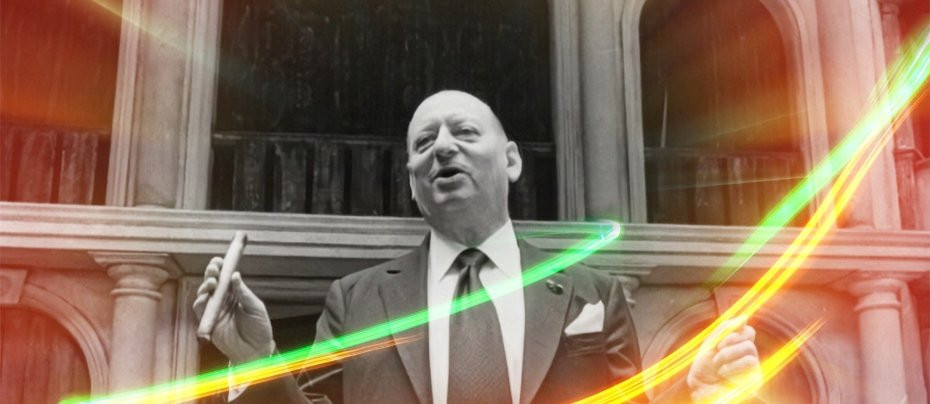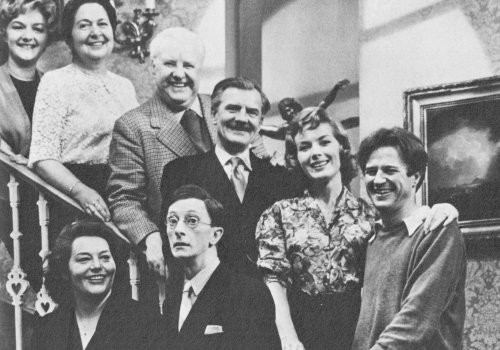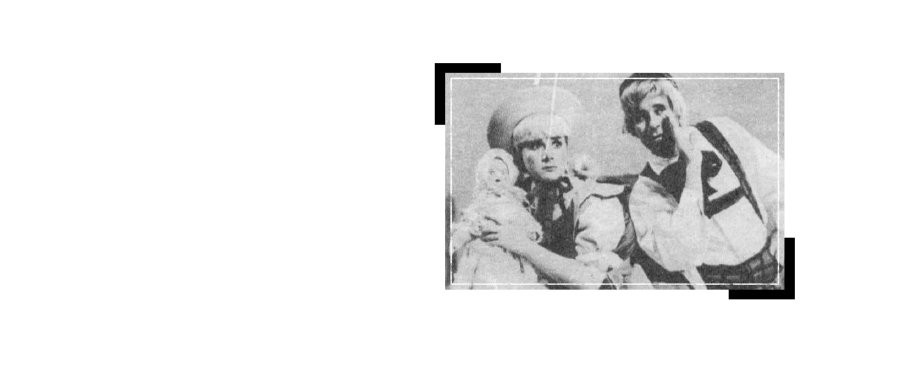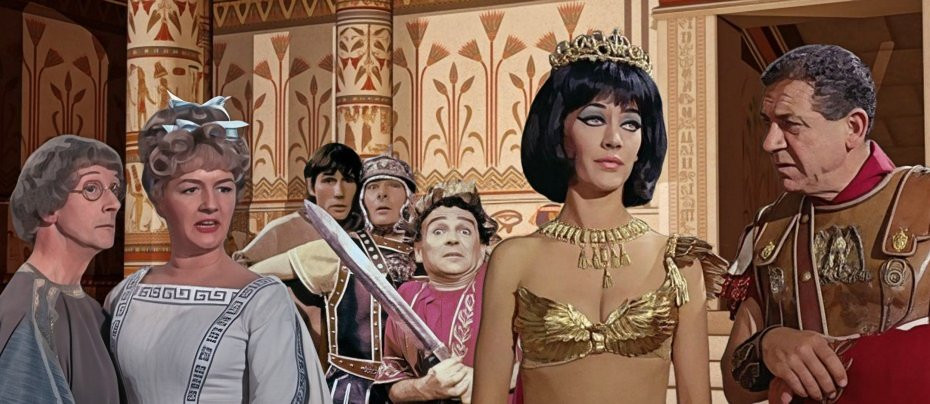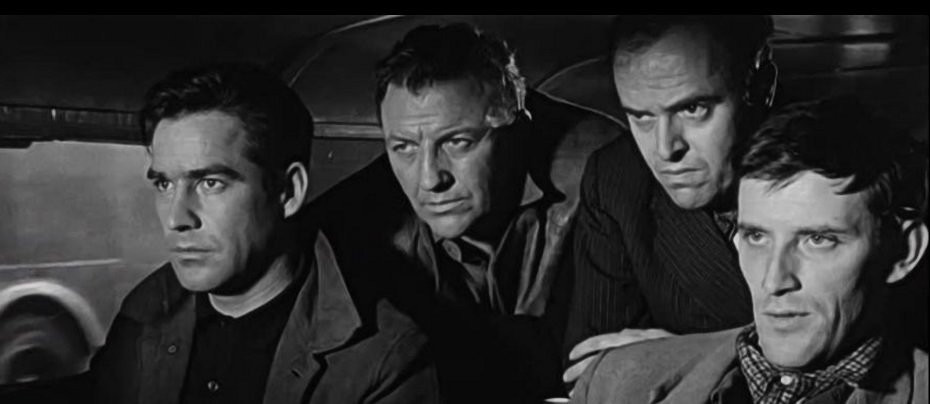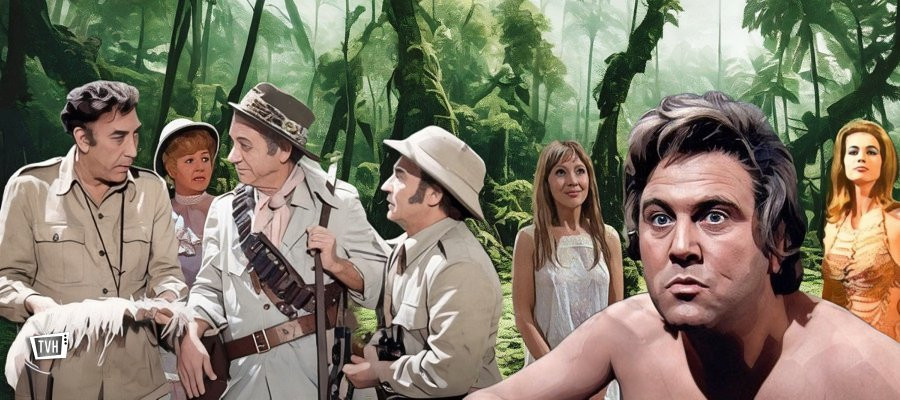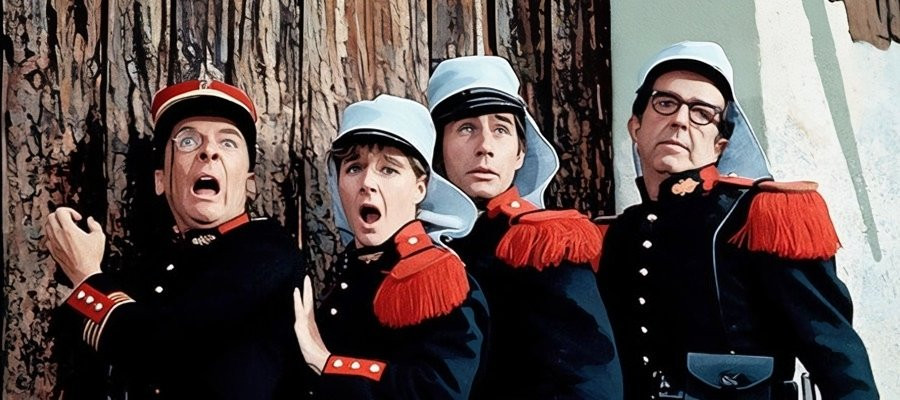
Carry On Follow That Camel
Reviewed by John Winterson Richards
What became Carry On Follow That Camel, like its immediate predecessor, Carry On Don't Lose Your Head, and for similar reasons, did not have the Carry On prefixed to its title on first release. It is sometimes said that this marketing error was mandated by contractual obligations, but, if so, it did not prevent the Carry On being added in some overseas markets and on domestic re-release. Anyway, it was obviously a Carry On, and its official title hardly matters because it is generally known by fans as "the one with Phil Silvers" or, perhaps more accurately, "the one with Sergeant Bilko."
Like most of the historically themed Carry On films it is less a historical parody than a parody of a specific depiction of history, in this case PC Wren's novel Beau Geste and its various film adaptations, most notably the silent version with Ronald Colman and the classic starring an oddly cast Gary Cooper in the title role. It also references other films in the somewhat eccentric Foreign Legion subgenre including Under Two Flags which also starred Colman.
Another thing that is often said about the film is that it was planned as a deliberate attempt at establishing the Carry On franchise as a major presence in the US market by employing a well known American star. If so, it was making a virtue of a necessity: the fact is that the script was written with Sid James as Sergeant Nocker, the comic lead, but it turned out that James was committed to George and the Dragon. (Had James been available for Follow That Camel the production would have ground to a halt after two weeks as, on 13 May 1967, he suffered a severe heart attack). Scriptwriter Talbot Rothwell claimed later that he kept hearing Silvers' immortal Bilko in his head as he was crafting lines for Sergeant Nocker, and it has to be said that his ear for Bilko-esque dialogue suggests he might have made a good writer on The Phil Silvers Show (and probably far more money there than he ever made from Carry On). Yet when producer Peter Rogers went in search of an American star because James was unavailable, it was the then relatively unknown Woody Allen he approached first, and Silvers was only the third choice after Allen declined.
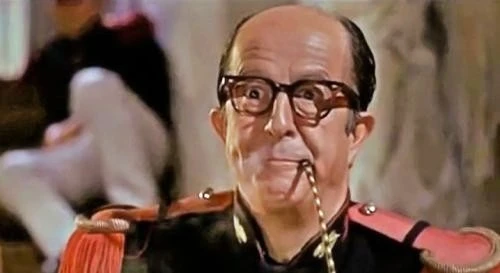
Silvers' Bilko persona actually fits in surprisingly easily with the by then well-established Carry On style. Yet it was always a distinctively British style, which is why it was never going to break into America, even if that really was the plan, and there are moments when the clash of cultures is slightly jarring. There is a good joke about Downing Street, which Silvers, ever the professional comedian, lands perfectly, but it sounds out of place coming from such a quintessential American. Even before finding out it was written originally for Sid James, your reviewer always felt it was an obvious Sid James joke and, just as Rothwell kept hearing Silvers' voice in his mind as he wrote Knocker's lines, I kept hearing James' voice as Knocker spoke them.
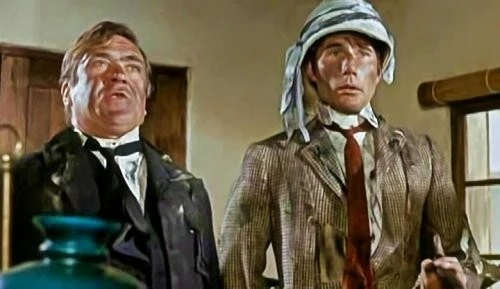
Jim Dale returns to his accustomed position as the heroic lead and plays a straight bat as the unsubtly named B.O. (Bertram Oliphant) or "Bo" West, who feels obliged to join the Foreign Legion after being accused, falsely, of cheating at cricket. Of course a gentleman could do no less. Peter Butterworth steals every scene as his overly faithful valet. Kenneth Williams and Charles Hawtrey are as unlikely a pair of hardened Foreign Legion officers as it is possible to imagine. If that is not enough to strain credibility, it seems that Hawtrey wanted the role of Bo West for himself, which would certainly have been ...different.
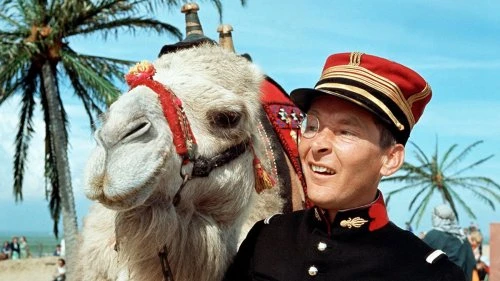
Angela Douglas is the girl he leaves behind him (how could he?). The implications behind her comic misadventures as an Englishwoman unwise enough to travel alone would certainly not pass the internal censors of a more sensitive generation, even if she proves herself more than equal to them. Yet even higher on the very long list of Carry On jokes that definitely "would not be allowed today" is the casting of the versatile but undeniably white Jewish Londoner Bernard Bresslaw as an Arab Sheikh. At the very top of the list, for the whole franchise not just this film, is its reuse of the venerable "Mustafa Liq" pun so beloved of generations of sniggering children.
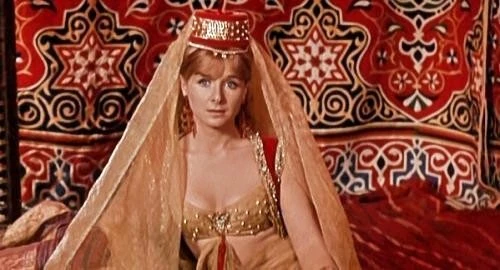
Joan Sims is perfect, as she usually was, as a cafe owner who falls for Nocker's questionable charms. Anita Harris is the dancing girl who proves his undoing. Peter Gilmore is well used as the slightly Flashmanesque bounder who really does cheat at cricket, and then lies about it, in order to get Bo out of the way so he can have a clear run at Angela - which is understandable, but still very bad form. Sally Douglas, no relation, and Angie Grant are harem girls, of course.
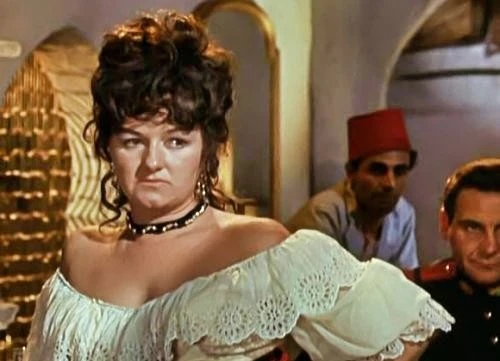
The production was hugely ambitious, costing almost £300,000 - an incredible sum by Carry On standards. Over a tenth of this, £30,000, was Silvers' fee and Rogers was under pressure to make sure the film proved worthy of that investment. In this he succeeded. Some impressive sets were built and happily it was possible to reuse them in the later Carry On Up the Khyber. A Carry On record of three weeks was spent filming on location, the beach at Camber Sands doubling surprisingly well for the Sahara. The only dune system in East Sussex, the beach's proximity to the concentration of British film studios South and West of London contributes to its frequent appearance on screen in various guises.
It seems it was not a happy shoot. The climate had nothing in common with the Sahara. It actually snowed heavily on the Sands during filming, the snow falling being incorporated as a sandstorm thanks to the brilliant use of a yellow filter. Blankets and brandy were required to keep Dale and Butterworth from hypothermia when they were supposedly buried up to their necks in the sand in sweltering heat. A camel and a horse proved notably unco-operative. Some malicious gossip from Williams caused an initial falling out between Dale and Butterworth - and then between Dale and Williams when the truth became known.
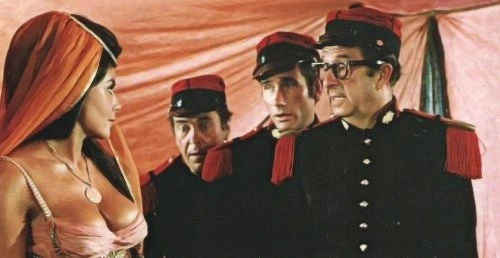
There is some truth to the claim that Silvers' ability to fit in with the regular team on-screen was not a reflection of what was happening behind the scenes. In retrospect one can see both sides. The health problems that would bring Silvers' career to a sadly premature end were already evident in the difficulty he had remembering his lines, which exasperated the rest of the cast. Any sympathy was undermined by his disproportionate salary, which was far more than anyone else was being paid or had ever been paid in a Carry On. For his part, Silvers seems to have been shocked by the Spartan filming conditions, despite them being fairly standard for the franchise, and most of the British film industry in general at that time - and indeed him being treated better than was usual, and much better than his fellow actors, which probably did not endear him to them. A star of his status in the United States expected a certain deference in such things. This was not necessarily due to snobbishness or ego: in Hollywood one's perceived professional status has commercial implications. In this respect the American entertainment industry is far more class conscious than the British, which is generally more democratic.
While the film was still profitable, if there ever were any serious hopes that the presence of an expensive star would enable it to break America, they were not realised. The experiment was not repeated, and productions became less ambitious: only Carry On Up the Khyber aspired to the relatively epic scale of Follow That Camel but at a much reduced cost.
While Follow That Camel, like Carry On Jack, lacks something of the feel of a classic Carry On, it is nevertheless an extremely entertaining film in its own right. Apart from anything else it is the closest we ever got to Bilko on the big screen - the Steve Martin abomination simply does not count - even if it should be noted that it missed the important subtext to Bilko, that he was a combat veteran who ultimately cared deeply for his men. It is still good to see Silvers provide a last characteristic performance on an appropriate scale and in an unusual setting, and the local supporting cast, in the form of the Carry On regulars, prove worthy of him.
Published on May 7th, 2025. Written by John Winterson Richards for Television Heaven.



